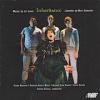
In the darkest days of the pandemic, while trying to make sense of “what seemed to be an avalanche of loss” in her personal life, soprano and veteran contemporary-music champion Susan Narucki discovered a reference in the letters of Rainer Maria Rilke to the work of Belgian Symbolist poet Émile Verhaeren, who died in 1916.
“If you could only be here with me so I could share with you the happiness of these great poems, they would let you realize what we all now need more urgently: that transience is not separation,” Rilke wrote in a letter dated Jan. 14, 1919. Exploring the works of Verhaeren, Narucki found a direct but compassionate poetic voice that recognized human frailty in all its forms but nonetheless was willing to love deeply without constraint.

Such began the exploration of musical settings of Verhaeren and his contemporaries that led Narucki to the 21 songs by four women composers on This Island (Avie). Accompanied by Donald Berman, with whom she has worked for decades on the songs of Charles Ives, Narucki interprets three songs by Henriëtte Bosmans, Quatre Mélodies by Élisabeth Claisse, the six Les Heures songs by Irène Fuerison, four songs from the famous collection Les Heures claires by Nadia Boulanger and Raoul Pugno, and Four Poems by Marion Bauer. The songs by Claisse, Fuerison, and Bauer receive their sadly belated first recordings.
The album’s title derives from the opening song, Bosmans’s “Dit eiland” (1947). This setting of a poem by Adriaan Roland Holst ends with the words “Be calm, close the doors shut … / love one another.” The music is fascinating, an indefinable mix of chromaticism and romanticism whose opening bars may bring to mind the first song of Alban Berg’s Seven Early Songs, written 40 years earlier. Inquisitive music lovers will certainly want to seek out more recordings of Bosmans’s music.
Narucki’s discoveries are invaluable. Claisse, for example, is so little known that Narucki could only ascertain that her four settings of Verhaeren’s poem “Les Mendiants” were composed in 1922–1923. Some of Claisse’s music exhibits a haunting sadness common to settings by Claude Debussy and other French composers whose lives extended into the first few decades of the 20th century.
Bauer wrote her Four Poems shortly after returning to the United States from a visit to Paris that included time with Boulanger, Pugno, and the painter Yves Tanguy. They’re quite lovely. As for Boulanger and Pugno’s songs, they’ve been recorded frequently, most recently on the invaluable four-CD set Les Heures claires: The Complete Songs of Nadia & Lili Boulanger (Harmonia Mundi).
The accompaniment to Fuerison’s first song from Les Heures claires, “Ô la splendeur de notre joie,” is sweetly perfumed and lush with romanticism. If her songs are, in one sense, a bit more conventional, they are nonetheless fetching in their ardent sweetness.
How I wish that Narucki sang with open vowels and consonants strong enough to clearly articulate lyrics. I sometimes struggled to figure out where she was in the French text. Worse was when she switched to English; I failed to recognize the language shift until I returned to the printed lyrics and translations.
Now in the fourth decade of her career, Narucki retains the unique timbre, accuracy, and steadiness that have made her soprano central to American contemporary vocal music. As much as her voice exhibits some of the classic signs of aging, she retains a sensitivity to meaning and an innate musicality that make this recording invaluable.




